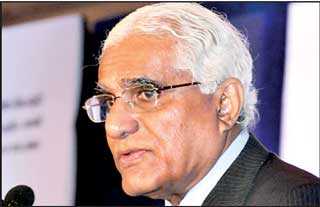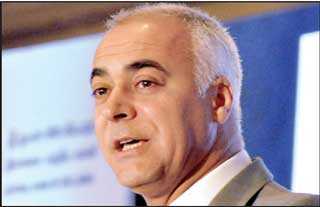Tuesday Feb 17, 2026
Tuesday Feb 17, 2026
Tuesday, 29 October 2019 00:00 - - {{hitsCtrl.values.hits}}
By Uditha Jayasinghe
Central Bank yesterday called for holistic approach to drive micro and small and medium enterprises via greater coordination and cooperation among promoting agencies as markets remained the biggest challenge for smaller entrepreneurs and businesses.
 |
Central Bank Governor
|
 |
Portugal Agrogarante MGS Chairman and Coordinator Jose Fernando Figueiredo |
“We have a plethora of institutions for SMEs but cooperation and collaboration remain a challenge. Rationalising the institutional structure is important to ensure that there is strong cooperation and coordination across these different institutions,” Dr. Coomaraswamy told the opening ceremony of the 32nd Annual Conference of Asian Credit Supplementation Institutions Confederation (ACSIC), hosted by the Central Bank.
Pix by Lasantha Kumara
It was pointed out that currently as much as 75% of Sri Lanka’s businesses were SMEs, which provide 45% of employment and constitute 52% of the country’s Gross Domestic Product (GDP). MSMEs account for one million business establishments and provide employment to 2.3 million people, according to the Industry and Commerce Ministry.
However, financing opportunities remain difficult, with high interest rates and emphasis on collateral by loan-givers constraining MSME and SME development. The contribution of formal financing by institutions is limited, allowing private money lenders to play a key role in MSME financing, albeit at exorbitant interest rates, Dr. Coomaraswamy observed.
“In any economy, it is the MSMEs and SME sectors that nurture inclusive economic growth and social inclusion. The SME sector also generates employment, reduces inequality and poverty and promotes entrepreneurship and innovation. Further, SMEs also contribute to balanced regional development as well,” he said.
The Governor opined that it was imperative that the overall environment for SMEs should be conducive. He highlighted training, inputs for technology and training, access to finance and marketing as the four key focus areas when developing SMEs.
“In my view, the most intractable problem is marketing. If the channels to marketing are cleared, even access to financing and everything else becomes much easier. In Sri Lanka we have had enough and more SME development schemes that have focused on production and not paid enough attention to marketing; linking SMEs and MSMEs to supply chains regionally and globally is very important. If you resolve markets then the other issues become a lot easier,” he told the gathering.
Dr. Coomaraswamy pointed out that in order to further the quest for affordable access to finance, the Central Bank had continued to facilitate insurance, finance and credit guarantee schemes funded by the Government and foreign sources. Currently, nine finance schemes and two interest subsidy schemes are overseen by the Central Bank.
In addition, the Central Bank also provides a range of credit supplementary schemes across the country. There are several other measures supported by different departments and institutions under the Government. Credit guarantee schemes include the comprehensive rural subsidy scheme, partial Government guarantee schemes for loans under Rs. 1.5 million and credit guarantees for exporters. Credit insurance and crop insurance schemes as well as customised export insurance schemes are also included under these measures. A new study on financial inclusion in Sri Lanka conducted by the International Finance Corporation, which is a subsidy of the World Bank, is also expected to be released at the end of the year.
Portugal Agrogarante MGS Chairman and Coordinator Jose Fernando Figueiredo, who was also appointed the Executive President of Instituição Financeira de Desenvolvimento (IFD), the Portuguese SME Promotional Financing Institution in 2015, addressing the forum, outlined the need for financing to be aligned with global challenges such as mitigating climate change.
The Central Bank in June launched the Roadmap for Sustainable Finance to encourage the financial system to promote financing for climate resilience projects to combat climate change in Sri Lanka.
“The sustainable finance movements are connected to the United Nations Sustainable Development Goals (SDGs) and Paris climate change agreements. We only have one planet and we have to do something quickly because otherwise climate change will bring massive losses. We may also not have a planet to leave to the next generation. So we can change our business models incorporating this zero carbon approach to regular businesses. Recent climate disasters have resulted in large payments from insurance companies. If we can avoid these payouts then these are resources that can be used elsewhere. There is much to be gained from connecting with the green economy,” he said.
He reiterated that the world was facing a daunting investment gap in delivering the Paris Agreement. The OECD estimates $ 69 trillion investment in energy, transport, building and water infrastructure will be required in the next two decades to meet the Paris Agreement’s targets.
“Although our duty is to finance SMEs and entrepreneurs to thrive, we also have to incorporate this new consciousness to our businesses. Basically, the idea is that we will need about € 200-300 billion to accomplish the goals set out in the Paris climate accord and resources are scarce. So we are now trying to understand how to change the flow of funds from certain investment opportunities into areas that are aligned with these new requirements.”
Figueiredo also emphasised the need for Central Banks and the financial system as a whole to define risks differently so that climate change is established at the centre of risk management and countries or businesses that plan with climate change within their policies are supported.
“We also need to manage risks better, which is not easy, but it necessary to consider these issues in the long term. One step is to recognise climate change as a systemic risk to banks moving forward and so Central Banks need to change the way risks are defined for banks. As the Governor has said, we do need to take a more holistic approach, not just as financiers but also be more connected and work as part of a network with others to ensure that all perspectives will be included in our business models, and train our entrepreneurs and businesses to think along these same lines. This is the task we have ahead of us.”